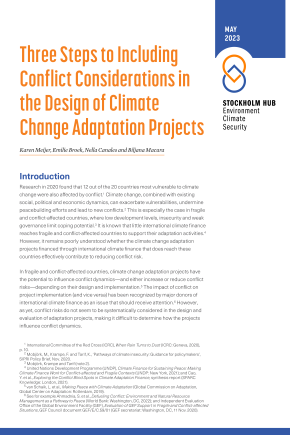Three Steps to Including Conflict Considerations in the Design of Climate Change Adaptation Projects
In fragile and conflict-affected countries, climate change adaptation projects have the potential to influence conflict dynamics—and either increase or reduce conflict risks—depending on their design and implementation. However, as yet, conflict risks do not seem to be systematically considered in the design and evaluation of adaptation projects, making it difficult to determine how they can influence conflict dynamics. This policy brief recommends a three-step approach to facilitating the consideration of conflict risks in the design of climate change adaptation projects that involves analysing the existing climate–conflict dynamics, assessing a project’s potential influence on them and, finally, integrating the insights gained from the first two steps into the project’s design.
Introduction
Step 1: Analysing climate-conflict dynamics at the project level
Step 2: Assessing how the project influences climate-conflict dynamics
Step 3: Integrating climate-conflict analysis into project design
Conclusions



